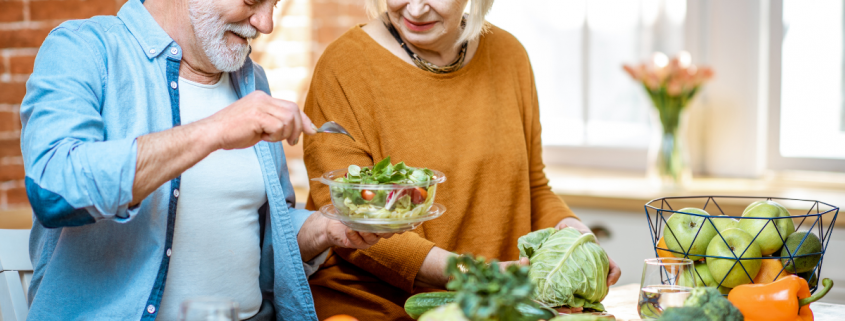Cancer-fighting foods: cooking tips for the elderly to reduce the risk of cancer
Proper nutrition has a huge impact on our health and quality of life. A well-balanced diet featuring the right proportions of proteins, fats and carbohydrates is the basis of our health and a means of preventing most diseases and ailments. Only by following the appropriate diet regime, our cells can renew themselves and we have sufficient energy to carry on living.
A well-balanced diet is also an essential part of cancer prevention. That is why today we are addressing this very topic. What should you eat to minimise your risk of developing cancer? What are the foods that prevent cancer? Find out about cancer-fighting foods and the most important principles of a suitable diet for cancer patients.
Can you prevent cancer by eating healthier?
As reported by the World Health Organisation (WHO), 30-40% of cancer risk can be attributed to lifestyle risk factors such as smoking, alcohol consumption, a diet low in fruit and vegetables, being overweight and obese, and physical inactivity. According to a 2018 report by the World Cancer Research Fund (WCRF) and the American Institute for Cancer Research (AICR), non-profit organisations that lead a network of cancer prevention charities with global reach, there are ten recommendations for cancer prevention in terms of diet and nutrition. The recommendations are based on the Cancer Research Continuing Evidence Update Project, which summarises current evidence with relevant work from randomised controlled trials and coordinated research.
There is a close link between the composition and type of daily diet and the risk of developing many types of cancer. Nutritional experts have succeeded in developing a regimen and recommendations for an anti-cancer diet with the potential for cancer prevention. It consists of providing the body on a daily basis with raw materials rich in compounds considered anticancer, so-called cancer-fighting foods.
Cancer-fighting foods and key recommendations of diets for cancer patients
Below we discuss the topic of diets for cancer patients, as well as cancer-causing foods along with reverse cancer-fighting foods.
Top cancer-causing foods and drinks
Apart from alcohol and tobacco products, our biggest enemy in the fight against cancer is meat, cold cuts and canned and smoked fish. Besides these, some of the most important cancer-causing foods are all products rich in sugar, because they increase body weight, and obesity is one of the most important factors in increasing the likelihood of developing malignant tumours. For this, the World Cancer Research Fund recommends limiting fast foods and other processed foods high in fat, starches or sugars, as this helps control calorie intake and maintain a healthy weight.
Top cancer-fighting foods
As you can probably guess, cancer-fighting foods mainly include vegetables and fruits, as well as whole grains in small quantities.
Besides including the following cancer-fighting foods in your diet as much as possible, it is also a good idea to include fruits and vegetables:
- reducing carcinogenic potential – garlic, onions, grapes and soft fruits, citrus, and brassica vegetables.
- inhibition of tumour cell growth – green tea, turmeric, soy, brassica vegetables, garlic and onions, grapes and soft fruits, citrus, tomatoes, omega-3 fats, dark chocolate.
- Effect on tumour necrosis – curcumin, soy, brassica vegetables, garlic and onions, grapes and soft fruit.
- interference with angiogenesis – green tea, turmeric, soya, grapes and soft fruits, omega-3 fats.
- impact on the immune system – turmeric, citrus, omega-3 fats.
Principles of a healthy diet for cancer patients and those who do not wish to become cancer patients
Vegetables are the basis
The World Health Organisation recommends up to eight to ten portions of fruit and vegetables a day in an anti-cancer diet in the context of cancer prevention. Due to their high fibre and secondary vegetable content, as well as their lower energy value, they should be eaten in the following proportions: at least three portions of vegetables and two portions of fruit per day.
Antioxidants
As researchers point out, the amount of antioxidants in the human body is directly proportional to life expectancy. The polluted environment in which we live and other factors of an unhealthy lifestyle significantly increase our need for protective antioxidants. Vegetables and fruit are abundant in the huge variety of antioxidants that are so important for protection against cancer.
Limiting salt and sugar
The final step in achieving a healthy cancer diet is to exclude or completely minimise the intake of salt and sugars, especially complex sugars.
Cancer prevention foods – conclusions
As you can see, a properly balanced diet has a huge impact on our health. Therefore, if you want to enjoy it for longer, give up meat, alcohol and sugar and replace them with vegetables and fruit.















